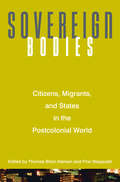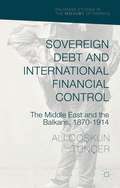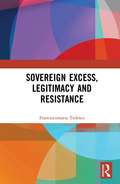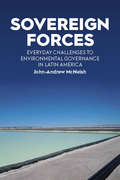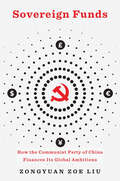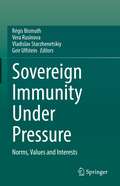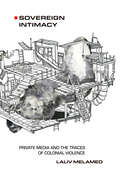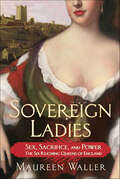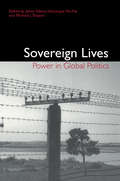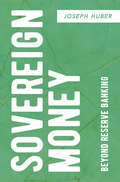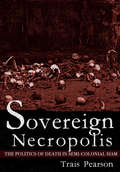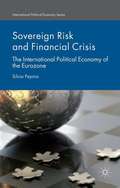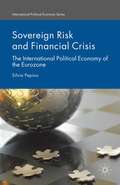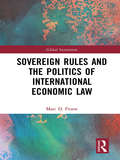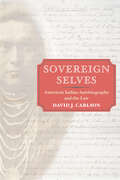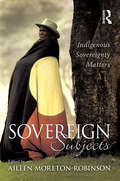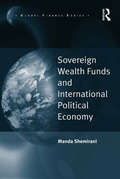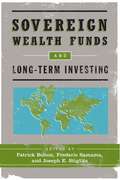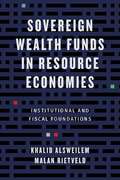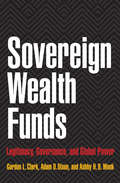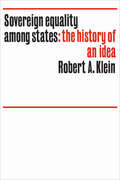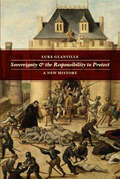- Table View
- List View
Sovereign Bodies: Citizens, Migrants, and States in the Postcolonial World
by Thomas Blom Hansen & Finn Stepputat9/11 and its aftermath have shown that our ideas about what constitutes sovereign power lag dangerously behind the burgeoning claims to rights and recognition within and across national boundaries. New configurations of sovereignty are at the heart of political and cultural transformations globally. Sovereign Bodies shifts the debate on sovereign power away from territoriality and external recognition of state power, toward the shaping of sovereign power through the exercise of violence over human bodies and populations. In this volume, sovereign power, whether exercised by a nation-state or by a local despotic power or community, is understood and scrutinized as something tentative and unstable whose efficacy depends less on formal rules than on repeated acts of violence. Following the editors' introduction are fourteen essays by leading scholars from around the globe that analyze cultural meanings of sovereign power and violence, as well as practices of citizenship and belonging--in South Africa, Peru, India, Mexico, Cyprus, Norway, and also among transnational Chinese and Indian populations. Sovereign Bodies enriches our understanding of power and sovereignty in the postcolonial world and in "the West" while opening new conceptual fields in the anthropology of politics. The contributors are Ana María Alonso, Lars Buur, Partha Chatterjee, Jean Comaroff and John L. Comaroff, Oivind Fuglerud, Thomas Blom Hansen, Barry Hindess, Steffen Jensen, Achille Mbembe, Aihwa Ong, Finn Stepputat, Simon Turner, Peter van der Veer, and Yael Navaro-Yashin.
Sovereign Debt and International Financial Control: The Middle East and the Balkans, 1870-1914
by Ali Coşkun TunçerSovereign Debt and International Financial Control.
Sovereign Excess, Legitimacy and Resistance
by Francescomaria TedescoWhen talking about his film Salò, Pasolini claimed that nothing is more anarchic than power, because power does whatever it wants, and what power wants is totally arbitrary. And yet, upon examining the murderous capital of modern sovereignty, the fragility emerges of a power whose existence depends on its victims’ recognition. Like a prayer from God, the command implores to be loved, also by those whom it puts to death. Benefitting from this "political theurgy" as the book calls it (the idea that a power, like God, claiming to be full of glory, constantly needs to be glorified) is Barnardine, the Bohemian murderer in Shakespeare’s Measure for Measure, as he, called upon by power to the gallows, answers with a curse: ‘a pox o’ your throats’. He does not want to die, nor, indeed, will he. And so, he becomes sovereign. On a level with and against the State.
Sovereign Forces: Everyday Challenges to Environmental Governance in Latin America
by John-Andrew McNeishSovereignty is a significant force regarding the ownership, use, protection and management of natural resources. By placing an emphasis on the complex intertwined relationship between natural resources and diverse claims to resource sovereignty, this book reveals the backstory of contemporary resource contestations in Latin America and their positioning within a more extensive history of extraction in the region. Exploring cases of resource contestation in Bolivia, Colombia and Guatemala, Sovereign Forces highlights the value of these relationships to the practice of environmental governance and peacebuilding in the region.
Sovereign Funds: How the Communist Party of China Finances Its Global Ambitions
by Zongyuan Zoe LiuThe first in-depth account of the sudden growth of China’s sovereign wealth funds and their transformative impact on global markets, domestic and multinational businesses, and international politics.One of the keys to China’s global rise has been its strategy of deploying sovereign wealth on behalf of state power. Since President Xi Jinping took office in 2013, China has doubled down on financial statecraft, making shrewd investments with the sovereign funds it has built up by leveraging its foreign exchange reserves. Sovereign Funds tells the story of how the Communist Party of China (CPC) became a global financier of surpassing ambition.Zongyuan Zoe Liu offers a comprehensive and up-to-date analysis of the evolution of China’s sovereign funds, including the China Investment Corporation, the State Administration of Foreign Exchange, and Central Huijin Investment. Liu shows how these institutions have become mechanisms not only for transforming low-reward foreign exchange reserves into investment capital but also for power projection. Sovereign funds are essential drivers of the national interest, shaping global markets, advancing the historic Belt and Road Initiative, and funneling state assets into strategic industries such as semiconductors, fintech, and artificial intelligence. In the era of President Xi, state-owned financial institutions have become gatekeepers of the Chinese economy. Political and personal relationships with prestigious sovereign funds have enabled Blackstone to flourish in China and have fueled the ascendance of private tech giants such as Alibaba, Ant Finance, and Didi.As Liu makes clear, sovereign funds are not just for oil exporters. The CPC is a leader in both foreign exchange reserves investment and economic statecraft, using state capital to encourage domestic economic activity and create spheres of influence worldwide.
Sovereign Immunity Under Pressure: Norms, Values and Interests
by Geir Ulfstein Régis Bismuth Vera Rusinova Vladislav StarzhenetskiyThis book offers a critical analysis of current challenges and developments of the State immunity regime through three dimensions: it looks at State immunity from a comparative perspective; it discusses the major trends relating to the interplay between State immunity and the protection of human rights as well as counter-terrorism; and it examines the relationship between State immunity and the financial obligations of States. Part I, Sovereign Immunity from a Comparative Perspective: Weak v. Strong Immunity Regimes, deals with the diversity of existing regimes of State immunity at the national level. This part aims to explore different approaches of particular states to sovereign immunity and their general attitude to international law, and attempts to understand why some States favour a weaker State immunity regime by multiplying exceptions or interpreting them broadly, while others continuously support a stronger one and sometimes rely on the doctrine of absolute immunity. Part II, International Customary Law of Sovereign Immunity, Human Rights and Counter-Terrorism, highlights how human rights and counter-terrorism have shaped the law and practice of sovereign immunity. This part specifically discusses the role of national legislators and judges in the development of international law, emerging conflicts between national constitutional norms and the rules of international law concerning State immunity and human rights, and possible ways of their reconciliation. Part III, Sovereign Immunity of States and their Financial Obligations, contributes to on-going debates related to the mixed and complex nature of States’ financial obligations. In this part, authors elaborate on perceptions of the underlying public-private law divide, cross influences in public and private international law and their consequences for State immunity, as well as recent trends relating to immunity from execution.
Sovereign Intimacy: Private Media and the Traces of Colonial Violence
by Laliv MelamedIn the early 1990s, Israeli television began dedicating Memorial Day airtime to videos produced by the grieving families of soldiers killed in the line of duty. When these videos first appeared, during a period of growing Israeli discontent with the occupation of southern Lebanon, they were widely perceived as a challenge to the state, reclaiming the dead from Israel’s militaristic memory culture by resituating them in intimate domestic contexts via mediated commemorations. By tracing an emerging media system of freelance filmmaking, privatized television, state institutes of care, and grassroots campaigns, Laliv Melamed reveals how these videos nevertheless avoid a fundamental critique of Israeli militarism, which is instead invited into the familiar space of the home. These intimate connections of memory and media exploit bonds of kinship and reshape larger relationships between the state and its citizens, enabling a collective disavowal of colonial violence. In Sovereign Intimacy, Melamed offers a poignant and critical view of the weaponization of home media and mourning in service of the neoliberal settler state.
Sovereign Jews: Israel, Zionism, and Judaism
by Yaacov YadgarThe question of Jewish sovereignty shapes Jewish identity in Israel, the status of non-Jews, and relations between Israeli and Diaspora Jews, yet its consequences remain enigmatic. In Sovereign Jews, Yaacov Yadgar highlights the shortcomings of mainstream discourse and offers a novel explanation of Zionist ideology and the Israeli polity. Yadgar argues that secularism's presumed binary pitting religion against politics is illusory. He shows that the key to understanding this alleged dichotomy is Israel's interest in maintaining its sovereignty as the nation-state of Jews. This creates a need to mark a majority of the population as Jews and to distinguish them from non-Jews. Coupled with the failure to formulate a viable alternative national identity (either "Hebrew" or "Israeli"), it leads the ostensibly secular state to apply a narrow interpretation of Jewish religion as a political tool for maintaining a Jewish majority.
Sovereign Ladies: Sex, Sacrifice, and Power: The Six Reigning Queens of England
by Maureen WallerMaureen Waller has written a fascinating narrative history---a brilliant combination of drama and biographical insight on the British monarchy---of the six women who have ruled England in their own names. In the last millennium there have been only six English female sovereigns: Mary I and Elizabeth I, Mary II and Anne, Victoria and Elizabeth II. With the exception of Mary I, they are among England's most successful monarchs. Without Mary II and Anne, the Glorious Revolution of 1688 might not have taken place. Elizabeth I and Victoria each gave their name to an age, presiding over long periods when Britain made significant progress in the growth of empire, prestige, and power. All of them have far-reaching legacies. Each faced personal sacrifices and emotional dilemmas in her pursuit of political power. How to overcome the problem of being a female ruler when the sex was considered inferior? Does a queen take a husband and, if so, how does she reconcile the reversal of the natural order, according to which the man should be the master? A queen's first royal duty is to provide an heir to the throne, but at what cost? In this richly compelling narrative of royalty, Maureen Waller delves into the intimate lives of England's queens regnant in delicious detail, assessing their achievements from a female perspective.
Sovereign Lives: Power in Global Politics
by Jenny Edkins Véronique Pin-Fat Michael J. ShapiroFor International Relations scholars, discussions of globalization inevitably turn to questions of sovereignty. How much control does a country have over its borders, people and economy? Where does that authority come from? Sovereign Lives explores these changes through reading of humanitarian intervention, human rights discourses, securitization, refugees, the fragmentation of identities and the practices of development.
Sovereign Money: Beyond Reserve Banking
by Joseph HuberIn coming to terms with the still smoldering financial crisis, little attention has been paid to the flaws within our monetary system and how these flaws lie at the root of the crisis.This book provides an introduction and critical assessment of the current monetary system. It begins with an up to date account of the workings of today’s system of state-backed ‘bankmoney’, illustrating the various forms and issuers of money, and discussing money theory and fallacy past and present. It also looks at related economic challenges such as inflation and deflation, asset inflation and bubble building that lead to market instability and examines the ineffectual monetary policies and primary credit markets that are failing to reach some sort of self-limiting equilibrium.In order to fix our financial system, we first need to understand its limitations and the flaws in current monetary and regulatory policy and then correct them. The concluding part of this book is dedicated to the latter, advocating a move towards the sovereign monetary prerogatives of issuing the entire stock of official money and benefitting from the gain thereof (seigniorage). The author argues that these functions should be made the sole responsibility of independent and impartial central banks with full control over the stock of money (not the uses of money) on the basis of a legal mandate that would be more detailed than is the case today. This includes a thorough separation of monetary and fiscal powers, and of both from banking and wider financing functions.This book provides a welcome addition to the banking literature, guiding readers through the inner workings of our monetary and regulatory environments and proposing a new way forward that will better protect our economy from financial instability and crisis.
Sovereign Necropolis: The Politics of Death in Semi-Colonial Siam
by Trais PearsonBy the 1890s, Siam (Thailand) was the last holdout against European imperialism in Southeast Asia. But the kingdom's exceptional status came with a substantial caveat: Bangkok, its bustling capital, was a port city that was subject to many of the same legal and fiscal constraints as other colonial treaty ports. Sovereign Necropolis offers new insight into turn-of-the-century Thai history by disinterring the forgotten stories of those who died "unnatural deaths" during this period and the work of the Siamese state to assert their rights in a pluralistic legal arena.Based on a neglected cache of inquest files compiled by the Siamese Ministry of the Capital, official correspondence, and newspaper accounts, Trais Pearson documents the piecemeal introduction of new forms of legal and medical concern for the dead. He reveals that the investigation of unnatural death demanded testimony from diverse strata of society: from the unlettered masses to the king himself. These cases raised questions about how to handle the dead—were they spirits to be placated or legal subjects whose deaths demanded compensation?—as well as questions about jurisdiction, rights, and liability.Exhuming the history of imperial politics, transnational commerce, technology, and expertise, Sovereign Necropolis demonstrates how the state's response to global flows transformed the nature of legal subjectivity and politics in lasting ways. A compelling exploration of the troubling lives of the dead in a cosmopolitan treaty port, the book is a notable contribution to the growing corpus of studies in science, law, and society in the non-Western world.
Sovereign Risk And Public-private Partnership During The Euro Crisis
by Gianluca Oricchio Maura Campra Eugenio Mario Braja Paolo EspositoThis book is an examination of the sovereign risk and debt limit issues facing the Eurozone (crisis/post crisis) and the need for alternative mechanisms to fund the capital investment requirements of the region.
Sovereign Risk and Financial Crisis: The International Political Economy of the Eurozone (International Political Economy Series)
by Silvia PepinoThis book provides an original and timely insight into the role that the domestic and international political economy played in the Eurozone sovereign debt crisis, combining an innovative theoretical framework with in-depth bond market analysis.
Sovereign Risk and Financial Crisis: The International Political Economy of the Eurozone (International Political Economy Series)
by Silvia PepinoThis book provides an original and timely insight into the role that the domestic and international political economy played in the Eurozone sovereign debt crisis, combining an innovative theoretical framework with in-depth bond market analysis.
Sovereign Rules and the Politics of International Economic Law (Global Institutions)
by Marc FroeseHow ought scholars and students to approach the rapidly expanding and highly multidisciplinary study of international economic law? Academics in the field of international political economy used to take for granted that they worked with the overarching concepts of rules and governance, while legal scholars analyzed treaties and doctrines. However, over the past twenty years formerly disparate fields of study have converged in a complex terrain, where academic researchers and governmental policy analysts use a pluralistic set of theoretical and methodological tools to study the ongoing development of international economic law. This volume argues that the extensive development of international economic law makes it impossible to discuss international political economy and international law as if they were mutually exclusive processes, or even as if they were separate and mutually reinforcing. Rather, we must think of them as a deeply interconnected set of rapidly evolving activities. This is a paradigm shift in which we cease to think about an international system in which politics and law interact, and begin to think about an international system in which politics take place in a legal frame. Froese terms this a shift from politics and law, to the politics of international economic law. This book does for political economy what others have already done for law – introduces political scientists, economists, and other practitioners of IPE, to the potential of engaging with legal theory and method; it will be of great interest to scholars in a range of areas including IPE, global governance, IR and international law.
Sovereign Selves: American Indian Autobiography and the Law
by David J. CarlsonThis book is an exploration of how American Indian autobiographers' approaches to writing about their own lives have been impacted by American legal systems from the Revolutionary War until the 1920s. Historically, Native American autobiographers have written in the shadow of "Indian law," a nuanced form of natural law discourse with its own set of related institutions and forms (the reservation, the treaty, etc.). In Sovereign Selves, David J. Carlson develops a rigorously historicized argument about the relationship between the specific colonial model of "Indian" identity that was developed and disseminated through U.S. legal institutions, and the acts of autobiographical self-definition by the "colonized" Indians expected to fit that model. Carlson argues that by drawing on the conventions of early colonial treaty-making, nineteenth- and early twentieth-century Indian autobiographers sought to adapt and redefine the terms of Indian law as a way to assert specific property-based and civil rights. Focusing primarily on the autobiographical careers of two major writers (William Apess and Charles Eastman), Sovereign Selves traces the way that their sustained engagement with colonial legal institutions gradually enabled them to produce a new rhetoric of "Indianness."
Sovereign Subjects: Indigenous sovereignty matters
by Aileen Moreton-Robinson; Rachel Fensham; Jon StrattonIndigenous rights in Australia are at a crossroads. Over the past decade, neo-liberal governments have reasserted their claim to land in Australia, and refuse to either negotiate with the Indigenous owners or to make amends for the damage done by dispossession. Many Indigenous communities are in a parlous state, under threat both physically and culturally.In Sovereign Subjects some of Indigenous Australia's emerging and well-known critical thinkers examine the implications for Indigenous people of continuing to live in a state founded on invasion. They show how for Indigenous people, self-determination, welfare dependency, representation, cultural maintenance, history writing, reconciliation, land ownership and justice are all inextricably linked to the original act of dispossession by white settlers and the ongoing loss of sovereignty.At a time when the old left political agenda has run its course, and the new right is looking increasingly morally bankrupt, Sovereign Subjects sets a new rights agenda for Indigenous politics and Indigenous studies.
Sovereign Virtue: The Theory And Practice Of Equality
by Ronald DworkinEquality is the endangered species of political ideals. Even left-of-center politicians reject equality as an ideal: government must combat poverty, they say, but need not strive that its citizens be equal in any dimension. In his new book Ronald Dworkin insists, to the contrary, that equality is the indispensable virtue of democratic sovereignty. A legitimate government must treat all its citizens as equals, that is, with equal respect and concern, and, since the economic distribution that any society achieves is mainly the consequence of its system of law and policy, that requirement imposes serious egalitarian constraints on that distribution. What distribution of a nation's wealth is demanded by equal concern for all? Dworkin draws upon two fundamental humanist principles--first, it is of equal objective importance that all human lives flourish, and second, each person is responsible for defining and achieving the flourishing of his or her own life--to ground his well-known thesis that true equality means equality in the value of the resources that each person commands, not in the success he or she achieves. Equality, freedom, and individual responsibility are therefore not in conflict, but flow from and into one another as facets of the same humanist conception of life and politics. Since no abstract political theory can be understood except in the context of actual and complex political issues, Dworkin develops his thesis by applying it to heated contemporary controversies about the distribution of health care, unemployment benefits, campaign finance reform, affirmative action, assisted suicide, and genetic engineering.
Sovereign Wealth Funds and International Political Economy (Global Finance Ser.)
by Manda ShemiraniFor the first time, Shemirani provides a systematic methodology for the study of Sovereign Wealth Funds (SWFs) over their life span and emphasizes the need for a paradigm shift in our approach towards the study of state capitalism. Applied in this book to the world's four largest SWFs - Government Pension Fund-Global of Norway, Abu Dhabi Investment Authority of the United Arab Emirates, Temasek of Singapore, and the National Wealth Fund of the Russian Federation, this methodology can also be applied to other funds or form a basis for further analytical studies of SWFs. In addition to its first hand approach, the book addresses concerns about the lack of transparency by offering insights into the functioning and investment strategies of the selected SWFs. Academics and students in international political economy, international finance and international business as well as financiers, business leaders, and policy makers, will find the subject and the approach of this book highly useful.
Sovereign Wealth Funds and Long-Term Investing: A New Form Of Capitalism?
by Joseph E. Stiglitz Patrick Bolton Frederic SamamaSovereign wealth funds (SWFs) are state-owned investment funds with combined asset holdings that are fast approaching four trillion dollars. Recently emerging as a major force in global financial markets, SWFs have other distinctive features besides their state-owned status: they are mainly located in developing countries and are intimately tied to energy and commodities exports, and they carry virtually no liabilities and have little redemption risk, which allows them to take a longer-term investment outlook than most other institutional investors. Edited by a Nobel laureate, a respected academic at the Columbia Business School, and a longtime international banker and asset manager, this volume examines the specificities of SWFs in greater detail and discusses the implications of their growing presence for the world economy. Based on essays delivered in 2011 at a major conference on SWFs held at Columbia University, this volume discusses the objectives and performance of SWFs, as well as their benchmarks and governance. What are the opportunities for SWFs as long-term investments? How do they fulfill their socially responsible mission? And what role can SWFs play in fostering sustainable development and greater global financial stability? These are some of the crucial questions addressed in this one-of-a-kind volume.
Sovereign Wealth Funds in Resource Economies: Institutional and Fiscal Foundations
by Malan Rietveld Khalid AlsweilemSovereign wealth funds (SWFs) have reached a transitional moment. Created as a way to direct excess wealth toward economic development and long-term financial returns, some countries are now seeing a decline in revenue from sources such as oil. Many SWFs are now facing a new challenge—how to spend sustainably without depleting the funds. Sovereign Wealth Funds in Resource Economies explains the fiscal rules and institutional structures that can make SWFs thrive, providing a practical and theoretical guide to their optimal use in resource-revenue management.Khalid Alsweilem and Malan Rietveld put forward an institutional perspective of SWFs as quasi-independent political and economic entities charged with managing national resource wealth, examining both investment and disbursement strategies. They advance a systematic, rule-based approach, suggesting when to accumulate and when to begin countercyclical spending based on concrete case studies. More than a mere financial portfolio, SWFs must be embedded in a credible fiscal and institutional framework if they are to contribute to improved economic performance. Alsweilem and Rietveld consider the variety of relationships that exist between SWFs and their governments, exploring the legal and policy side of the institutional approach. Their rule-based description of SWFs, since it allows tailoring and adjustment and invokes rules of thumb and best practices, is intended to be widely applicable across the diverse spectrum of global SWFs. Bringing together the practitioner perspective and scholarly expertise, this book will be invaluable for global policy makers and scholars working with sovereign wealth funds.
Sovereign Wealth Funds: Legitimacy, Governance, and Global Power
by Gordon L. Clark Adam D. Dixon Ashby H.B. MonkThe worldwide rise of sovereign wealth funds is emblematic of the ongoing transformation of nation-state economic prospects. Sovereign Wealth Funds maps the global footprints of these financial institutions, examining their governance and investment management, and issues of domestic and international legitimacy. Through a variety of case studies--from the China Investment Corporation to the funds of several Gulf states--the authors show that the forces propelling the adoption and development of sovereign wealth funds vary by country. The authors also show that many of these investment institutions have identifiable commonalities of form and function that match the core institutions of Western financial markets. The authors suggest that the international legitimacy of sovereign wealth funds is based on the degree to which their design and governance match Western expectations about investment management. Undercutting commonplace assumptions about the emerging world of the twenty-first century, the authors demonstrate that even small countries with large and globally oriented sovereign wealth funds are likely to play a significant role in international relations. Sovereign Wealth Funds considers how such financial organizations have altered not only the face of finance, but also the international geopolitical landscape.
Sovereign equality among states: The history of an idea
by Robert KleinUncritical adherence to the concept of sovereign equality is a major stumbling block to the reorganization of the world community. This study is the first place to trace the origins of the wording of the concept as it appears in the UN charter, as well as its historical antecedents and philosophical foundations. Two contradictory ways of viewing sovereign states and maintaining order among them are discussed. According to one, states are abstract entities with a fictitious personality; according to this view, international affairs must be based on the concept of great-power primacy. The opposite view, brought to world attention at the Hague Peace Conference of 1907, endows states with human personalities and transfers to them the political principle of individual equality. The book develops the tension between the real world of international politics and the abstract world where opposing concepts abide.
Sovereignty & the Responsibility to Protect: A New History
by Luke GlanvilleIn 2011, the United Nations Security Council adopted Resolution 1973, authorizing its member states to take measures to protect Libyan civilians from Muammar Gadhafi’s forces. In invoking the “responsibility to protect,” the resolution draws on the principle that sovereign states are responsible and accountable to the international community for the protection of their populations and that the international community can act to protect populations when national authorities fail to do so. The idea that sovereignty includes the responsibility to protect is often seen as a departure from the classic definition, but it actually has deep historical roots. In Sovereignty and the Responsibility to Protect, Luke Glanville argues that this responsibility extends back to the sixteenth and seventeenth centuries, and that states have since been accountable for this responsibility to God, the people, and the international community. Over time, the right to national self-governance came to take priority over the protection of individual liberties, but the noninterventionist understanding of sovereignty was only firmly established in the twentieth century, and it remained for only a few decades before it was challenged by renewed claims that sovereigns are responsible for protection. Glanville traces the relationship between sovereignty and responsibility from the early modern period to the present day, and offers a new history with profound implications for the present.
